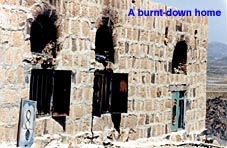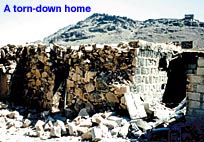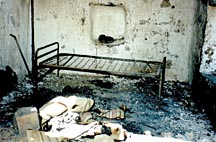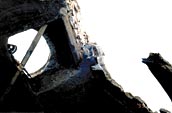
When the Armed Forces Turn Against the People [Archives:1999/15/Front Page]
April 12 1999
They shot at the people and chased them into the mountains. They burned and pillaged the homes. They looted the belongings. They killed the livestock. They horrified the children…

It happened on Sunday March 21st. The attackers were soldiers from the para-military Central Security Forces of the Republic of Yemen. The victims are Yemeni citizens in Sa’eed Village, Sabah District in Al-Baidha governorate. It lies about 25 kilometers south-west of Reda City.
A Yemen Times team visited the place and was deeply shocked.

The dispute started over a piece of land located on the eastern side of the village. The land was bought by Salah’s grandfather long ago. Salah was cultivating half of the land, but the other half was unused. Recently Hassan Ali Al-Montaser claimed that the unused land was theirs, despite being presented with proof to the contrary.
He was told that the whole land was sold by his grandfather to Salahs’s grandfather, but he brought a tractor and attempted to farm the land anyway. He was stopped by the rightful owners of the land, but he then went to Radaa and brought back four constables with him. Salah was not there, so they took his nephew and they threw him in jail at Raada. The next day Hassan came back with more policemen, Salah and a relative ran away – they don’t have enough money to bribe the police to leave them alone- The policemen started firing randomly, and only later did they realize that a policeman had been shot. Mr. Aziz said, “Of course, we are sure the fleeing persons did not kill the policeman, because they did not fire a single shot.”

They set Salah’s house on fire, and several other houses as well. They looted nearly all the houses, of which there were around 55. The young people fled the village to the surrounding mountains to avoid trouble, while the policemen abused and insulted the old people who remained in the village. They took away 150 goats and 5 cows, which they sold, and they ate about 80 goats during their occupation of the village. The gold they stole is worth millions of Rials, and even the mattresses were taken away, nothing was left. Some of the villagers hid their mattresses, but the policemen found and burnt them. They did not even leave the school, they broke down the gate, chairs, desks and windows, they pulled out the trees. The mosque was also robbed, they took away the amplifier and broke the speakers and microphones. The only source for clean drinking water for the whole village was a small pond, and they filled it up with rocks and sand to make the villagers confess and disclose the whereabouts of the wanted men. Dogs and donkeys were shot dead.

A 12 year-old kid was questioned by them, and when he did not give them the answer they wanted to hear they shot him on his knee. When his grandmother tried to aid him she was kicked and the constable called her a bitch. The boy’s mother had a gun jammed in her mouth when she tried to help.
The police force occupied the village for eight days, and sent the inhabitants out of their houses so that they could stay in them. They left the village just two days before Eid. On hearing the news, some of the village inhabitants came back to spend their worst Eid ever in the village. They were trying to give emotional and mental support to their families, but the police returned and surrounded the village and arrested eight of its inhabitants. Their only crime was that they belonged to Saeed village. They were jailed to blackmail the fugitives into turning themselves in. These men are still behind bars. If every case was solved in this way, half of Yemen, if not more, would have been behind bars.
The inhabitants feel that Ahmed Nasser Al- Dahiri, the Commander of the Central Security Unit, who is under the Director of Security Ali Ahmed Al-Shaaz is behind all this. The policemen had acted on their own without orders from the central security or the general security offices.
The people of Saeed village have lost everything, they don’t even have mattresses to sleep on. Some of them are living the lives of refugees, after their houses were leveled to the ground. Salah has disappeared. His family has lost everything, including their house, and are currently living in relative’s homes. After losing everything, the future means nothing to them.
Will there be someone responsible enough to bring justice back to this village? And can anyone assure them and the whole nation that the law will be upheld so that no one can get away with such barbarous activities?
Following is a brief history of working career:
Head of the communication Department in the former Yemen Airlines Alyemda. Here Ba Sweed took part in the musical parties organized by the company in honor of the distinguished employees.
In 1990, suffering form asthma, he retired and gradually became unable to continue in the lovely world of music and songs. His fight with asthma lasted till he passed away in April 12th last year 1998.
By: Mohammed Bin Sallam & Hatem Bamehriz
Yemen Times
——
[archive-e:15-v:1999-y:1999-d:1999-04-12-p:./1999/iss15/front.htm]


